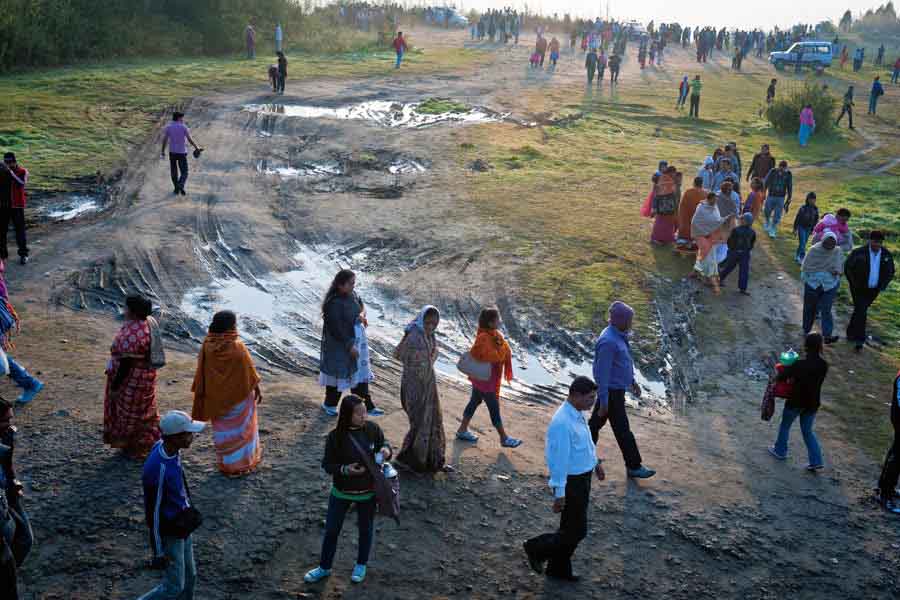An environmental activist’s concern about how the swank makeover of Tiger Hill off Darjeeling has damaged the environment of the popular tourist spot has prompted the eastern zonal bench of the National Green Tribunal, based in Kolkata’s New Town, to issue notices to several key Union and state government departments as well as the Hills district administration.
Tiger Hill is globally recognised as one of the best sunrise viewpoints with Mount Kanchenjungha and Mount Everest in the background.
The bench has asked the Union environment, forest and climate change ministry, state urban development and municipal affairs department, state environment department, state forest department, West Bengal Pollution Control Board, the district magistrate office as well as the Darjeeling Municipality to respond within four weeks to the allegation that the environmental status of the iconic Tiger Hill has severely deteriorated owing to unplanned activities.
Tiger Hill, at an altitude of 8,000ft from the sea level, is part of the Senchal wildlife sanctuary, one of the oldest wildlife sanctuaries in the country that was established in 1915, holding two lakes that act as main sources of drinking water to the town of Darjeeling.
Bench lists complaints
The bench, comprising Justice B. Amit Sthalekar and expert member Arun Kumar Verma, listed the complaints filed by petitioner environmentalist Subhas Datta and observed that the “matter requires consideration”.
The bench mentioned the complaints in the petition, including concretisation of Tiger Hill, setting up of mobile towers, construction of toilets without proper sewerage management as well as construction of large car parking lots and rest houses, thereby destroying greenery and completely changing the landscape of the area. Burning and littering of plastic waste all over Tiger Hill was also mentioned.
“It is stated that the said wildlife sanctuary has several endangered plants, animal and bird species and … in 2017 the place has been declared as ‘Protected Area’ …” said the bench.
“Tiger Hill has been turned into a concrete hill. The iconic place is not only a green zone but also a water catchment area for supplying drinking water to Darjeeling town and the adjoining places. Despite the place being a protected area, rampant violations have been taking place, not only putting the future of Tiger Hill, but also Darjeeling town, into uncertainty as the already water-stressed town may lose its main source of water supply,” Datta told The Plurals.
On March 27, Datta submitted a 96-page petition listing several environmental irregularities plaguing the iconic Tiger Hill, an internationally acclaimed tourism point, famous for the sunrise view in the Himalayas that attracts thousands every day.
Datta complained that “just to facilitate tourism, the Tiger Hill viewpoint has been concretised” and complained about the abandoned “big concrete and steel structures” that have come up at the topmost point of Tiger Hill; as well as a large parking space and a guest house under the façade of the forest museum.
The activist also complained that human interference and new settlements of people on the hilltop have been increasing regularly, observing that these “are detrimental not only to the biodiversity of the sanctuary but also for the water catchment area”.
Datta pointed out that despite Tiger Hill being a plastic-free zone, plastic waste could be found in some spots bearing signs of burning and held “failure on the part of the controlling authority” as the reason.
The activist pointed out in his petition that as per the Union environment, forest and climate change ministry notification, a monitoring committee is supposed to be set up to monitor eco-sensitive zones like Senchal wildlife sanctuary; but no monitoring committee has yet been set up. “… There is no zonal master plan, tourism master plan,” Datta said.
Passing the buck
As the green tribunal took cognizance of the violations and asked government departments to respond, the state government departments have started to pass the buck.
“The municipality has no control over the development at Tiger Hill and our only connection to the area are the lakes from where Darjeeling city gets water,” Dipen Thakuri, the chairman of Darjeeling Municipality, told The Plurals, adding that he would look into the NGT order and finalise the municipality’s response after speaking to lawyers.
“If any violations are found, the responsibility lies with the state forest department as the area is under their control and they also take a fee to allow tourists at Tiger Hill,” said a district official.
“Though a permission is technically required from us, we hardly know about the details of developments taking place in Tiger Hill,” said a forest department official.
“Development work in Tiger Hill was initiated by the British,” a state government official said.
